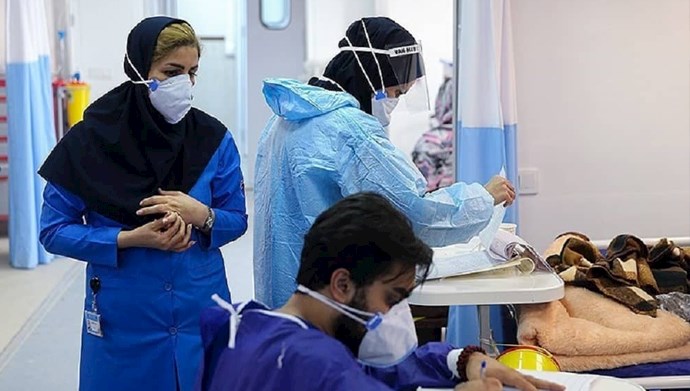Analysis by PMOI/MEK
Iran, September 24, 2021—Reports from Iran on Wednesday show a 6.7 percent increase in deaths from Covid-19 and a 36.7 percent increase in the number of people infected by the virus since the beginning of this week.
The state-run Tasnim news agency warned on Wednesday about the possibility of a sixth covid peak beginning, reporting that the number of daily cases compared to last week increased by 36.7 percent to 17,564 cases and is again approaching the 20,000 cases per day threshold.
According to this report, the hospitalization rate in Iran's medical centers has increased by 25.51 percent and 1.79 people are admitted to medical centers every minute.
However, according to many Iranian experts and even regime officials, these official statistics are not correct, and the main statistics are at least twice those published on a daily basis by the Health Ministry.
Despite the fact that the Health Ministry has announced that the age requirement for vaccination has been lifted, at least 70 percent of Iran’s population need to be fully vaccinated in order to control the corona crisis.
Health Minister Bahram Eynollahi said recent that 50 percent of the people have been vaccinated, and that this number will reach 70 percent in two or three weeks, according to a September 21 report wired by the regime’s official IRNA news agency.
According to the Health Ministry’s own numbers, however, a mere 17 percent of the population have been fully vaccinated and only 37 percent have received one dose.
Last week, Eynollahi also claimed that Iran had set a record of vaccination in the world, which of course was a lie.
Meanwhile, various regime’s factions are condemning their domestic rivals for banning the import of internationally approved vaccines. Supporters of regime President Ebrahim Raisi see the acceleration of vaccine imports as a sign of shortcomings on the part of former president Hassan Rouhani's cabinet, adding that the previous government resorted to political pretexts to ban the import of vaccines.
Massoud Pezeshkian, a member of the regime’s Majlis (parliament) Health Commission, said recently that the previous government had ordered the vaccine, adding that Raisi’s government has “not ordered any vaccines."
Critics of Raisi’s government are also saying that the supreme leader's orders banning the import of British and American vaccines, alongside a pledge by the Execution of Imam Khomeini's Order (EIKO) entity to produce 50 million vaccine doses by this September, and sanctions have all played a role leading the country into the status quo.
Iranian regime Supreme Leader Ali Khamenei banned the purchase of globally approved vaccines back in February. "American and British vaccines are not allowed in the country. I told the officials this before and I say it publicly now,” he said.
Following Khamenei's orders, officials at the regime's Health Ministry said they were trying to import the vaccine from other countries, most notably China's Sinopharm and Russia's Sputnik.
Many analysts at the same time stated that the main reason for the ban on the import of American and British vaccines to Iran seems to be EIKO’s efforts to produce domestic vaccines and monopolize its market in the country.
At the same time, various entities close to the Revolutionary Guards (IRGC) unveiled several vaccines that they claimed will be produced. There are no such vaccines as of yet.
This turmoil and mismanagement has led to a sharp rise in the number of covid deaths across Iran in recent months, prompting Khamenei on August 11 to say publicly that the vaccine would be provided "in any way possible."
On Tuesday, September 14, the state-run Sharq newspaper shed light on a portion of regime-linked entities’ measures and why covid vaccines were not imported.
“It seems that the reasoning behind ban on foreign vaccines was that the Barekat Company had prior to their production already received 2,000,000 rials (around $8 at the time) for each dose of vaccine. If we account for 120 million vaccine doses, Barekat received over $1 billion from state funds," the report reads.
Barekat has only delivered five million doses of vaccine to this day.
With the $1 billion that Barakat received from the government, the globally approved vaccines could have been purchased much earlier to prevented Iran’s ever-rising coronavirus death toll.





